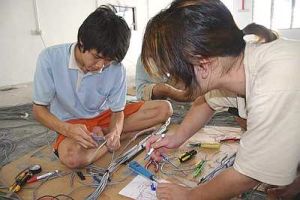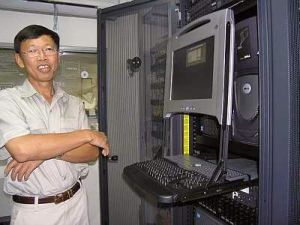Archive for the ‘CCTV’ Category
The Star – Students take charge
The Star – Sunday, 5th November 2006
Original Story Link – http://thestar.com.my/education/story.asp?file=/2006/11/5/education/15903734
THE first thing that you notice when you walk into a computer lab of SMJK Dindings is the lack of grilles, bolts or chains.
The doors are flung wide open and anyone can walk in and out of the computer labs freely.
And most progressive of all is – no teacher supervision.

SMJK Dindings students also helped build the school’s computer labs.
SMJK Dindings students also helped build the school’s computer labs.
“I believe that people basically can be trusted and educated. But I also believe that if the punishment is hard, swift and fast when a rule is broken, people will tow the line,†says SMJK Dindings principal Tiong Ting Ming.
Discipline is the rule at the school and that includes computer usage and Internet etiquette.
He says that he begins with instilling discipline in students.
“They must abide by the school rules – be on good behaviour, dress smartly, and keep the schools clean and orderly. When that is instilled, discipline in other areas comes naturally.â€
Tiong is not one to mince his words and his students know that.
Those who are caught visiting violent or pornographic websites are given public caning at the school’s assembly.
A cyber hub by the sea
Tiong says at the end of the day it is down to the question of need.
“Students know that they will forfeit their right to use the computers if they are caught doing what they are not allowed to in the labs, so they don’t try anything,†he adds.
Pasted on notice boards all around the school and inside the labs, the rules are few and clear, including no sharing of password or user account and no wastage of ICT resources and no computer games.
The open policy at the humble small town school seems to work.
At Dindings, students and teachers have easy access to ICT facilities with its flexible opening hours including on weekends or during holidays.
Along with the unlimited access to the Internet, they are also provided with printing facilities. There is no limit for computer use in the school but students are expected to log off after an hour if the labs are crowded.
SMJK Dindings also has the honour of being the only non-technical secondary school offering the specialised Fundamentals of Programming subject for Sijil Pelajaran Malaysia (SPM).
High-tech road
The school’s high-tech journey began when Tiong became its principal in 1991.

TIONG: I entrust students to manage and maintain the school’s ICT facilities. I don’t rely on the teachers.
The dropout rate was high and to persuade students to stay in school, Tiong introduced ICT courses.
With initiative, enthusiasm and hard work, the semi-government school managed to equip itself with ICT facilities.
Tiong’s friends in technology firms donated second-hand equipment, which he and his students repaired during their spare time.
The beginning, he admitted, was difficult with a lot of teachers and students resisting change.
After raising RM470,000 through various contributions in 1993, the school constructed its new building wired with the latest high-speed Internet connections.
Now, there are about 130 computers – in five computer labs, the library, staff room and even in the classrooms. With the expanded infrastructure, Tiong set up a team of computer prefects or cyber brigade.
They got the support of IT company Microsoft and the Education Ministry, and students are provided training to repair and maintain ICT facilities.
Duties include maintaining and upgrading the ICT facilities as well as repairing the hardware.
Form Four cyber brigadiers Yee Yin San and Ho Zi Ling say the training they received has been very useful.
“Sometimes, when our own computers break down we can repair it ourselves,†says Yee.
Proud of his team of “helpersâ€, Tiong says it all depends on how students are treated.
“I entrust them to manage and maintain the school’s ICT facilities and students take charge. I don’t rely on the teachers. Everything is done by the students.â€
Free access
Still, a filtering software is installed to track students’ Internet outings. The “Squidguard†blocking specific websites deem undesirable.
“You can’t be 100% thorough but if students break the rules too often, we’ll catch them.
“Students can go on the Internet to search for information on what they like such as music and movie, mobile phones and cars.
“They also love to download and share those files; indirectly they are learning to communicate and how to conduct research on the Internet,†he says.
Chatting is allowed but certain networking websites like MySpace and YOUTube are blocked during the exam period.
He adds that although there are educational games, most students play only “shooting†games.
“It is important to create the right ICT culture in the school. If we allow students to play online games, the labs will become game houses and neither we, nor the parents, want that.â€
The printer log files and quota system effectively control printer usage while the centralised virus scanning and spam control filter out the viruses and spam mails.
The wired and wireless CCTV system at strategic locations records the people accessing the ICT facilities and help guard the ICT equipment.
Tiong admits that even with the availability of computers, some students still visit cybercafes.
“I believe a very small percentage of them go to cybercafés to play games or surf pornographic sites and not to do their homework. Most of them will come to school to use the computers and Internet facilities anyway.â€
He feels that stricter regulations on the licensing of cybercafes will not affect his students.
“It is not cheap to use Internet and ICT facilities in cybercafés. In school, the ICT facilities and lessons are readily available, all for only RM12 a month.
“As far as my school is concerned, stricter regulations will actually drive more students back to school.â€
Lauding the government’s move to set up cybercafes in schools, he nonetheless feels that it will depend on how well the schools manage the easy access to ICT facilities.
“The easy access to ICT facilities, the Internet proxy and tracking policy, the monitoring of ICT usage and the safety of ICT equipment will determine the failure or the success of the plan to set up the cybercafés in school.
“For my school, I am confident enough to let the students use the ICT faculties without adult supervision during school hours because the monitoring and tracking system is reliable and the rules and regulations effective,†he adds.